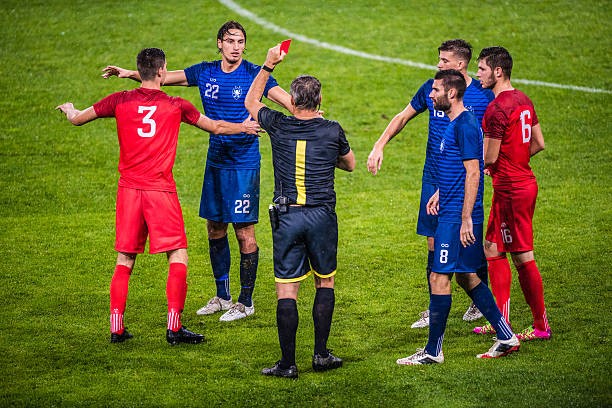Blue Card Might Be Implemented for Sin Bins in Football
A single blue card allows referees to send players

Millions of football fans not only enjoy watching the game but also engage via platforms like this betting site, Betfair Exchange. However, the growing concern over the disrespect shown towards referees and other match officials has demanded attention. The issue has escalated to the point where players and coaches frequently clash with match officials over decisions made during games. Will the introduction of a blue card have the desired effect, though?
What’s A Blue Card and How Does It Work?
Red and yellow cards have long served as the referee's main mechanisms for enforcing discipline on the football field. A red card allows a referee to eject a player from the game, whereas a yellow card acts as a cautionary measure. However, when a player shows disrespect towards a match official, merely issuing a yellow card often proves insufficient for teaching a lasting lesson, as it does not entail removing the player from the game. This challenge prompted the International Football Association Board (IFAB) to introduce the 'blue card' concept, aiming to address this specific issue more effectively.
Here’s what to expect:
- A single blue card allows referees to send players off the field for 10 minutes when they commit cynical fouls or dissent. The player will be sent to a ‘sin bin’ as punishment
- Two blue cards result in the dismissal of a player for the rest of the match
- A single blue card and a yellow card will also result in the dismissal of a player for the rest of the match
The introduction of the blue card represents a concerted effort by the International Football Association Board (IFAB) to promote fair play in football. The IFAB has initiated the "sin bin" trial, testing the blue card's effectiveness in youth and amateur football matches across England and Wales. Part of this trial includes a specific rule whereby only team captains are permitted to approach referees during certain situations in a game, further aiming to streamline interactions and respect on the field.
Feedback from the Sin Bin Trial
Mark Bullingham, the Chief Executive of the Football Association (FA), has stated that the trials of the blue card and associated rules have been highly successful. According to him, these initiatives have significantly reduced instances of dissent in grassroots football. He views this improvement in player behavior as just the beginning, expressing optimism that the positive effects will expand to address other issues in the game, such as tactical fouls.
Why Is the Implementation of the Blue Card Delayed?
The primary obstacle to rolling out this innovative concept is the stance of the Federation Internationale de Football Association (FIFA). The global governing body for football deems the reports from the sin bins trial to be premature, expressing skepticism about the feasibility of implementing such measures at the professional level. FIFA has stated that these trials should be conducted cautiously and only at lower levels of the sport, indicating a cautious approach to widespread adoption.
Conclusion
Efforts to tackle dissent and cynical fouls in football have led to the introduction of various measures, with the blue card being the latest attempt. Initial results from the sin bin trials have been encouraging.
Yet, FIFA, UEFA, and the major football leagues have not embraced this concept, leaving its future in professional matches uncertain. Despite FIFA's reservations, the International Football Association Board (IFAB) is determined to proceed with the sin bin trial, with plans to discuss its continuation at their annual meeting in Glasgow. There, the blue card will undergo testing at the senior level of the sport, indicating a commitment to exploring its potential benefits further.







